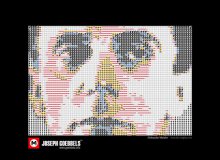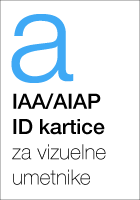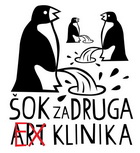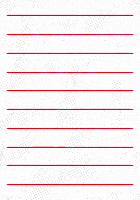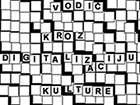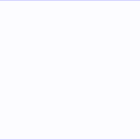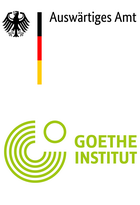Emergency Residencies for Ukrainian Literary Artists
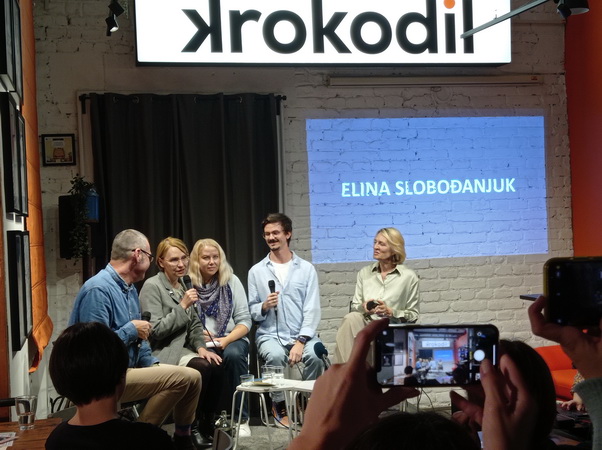
The Crocodile Association dedicated its residency program for writers, which it has been implementing since 2012, to literary artists from Ukraine - as a sign of support for that country after the February Russian invasion. Given that a large number of Ukrainian writers were offered a similar program in other European countries, the Crocodile decided to open the doors of its "House for Writers" within the "Spaces of Freedom" Program to all literary artists from Ukraine, including poets, essayists, translators, editors, journalists, comic book authors, theorists, columnists, singer-songwriters, rappers, spoken-word performers, etc.
The first guests - Historian and Author Elina Slobodianiuk and Author and Journalist Mark Livin presented themselves on October 18 at Crocodile's Center for Literature, with the participation of Professor Ljudmila Popović from the Department of Ukrainian Studies at the Faculty of Philology in Belgrade and Vladimir Arsenijević from Crocodile, who looked back to other activities of that association as well to help war-torn Ukraine, starting with the delivery of humanitarian aid for premature babies in Kharkiv.
Elina Slobodianiuk and Mark Livin presented different experiences related to the beginning of the war on February 24, and the audience saw them off with applause and stated together with them: "God save Ukraine!"

Before Serbia, Livin stayed in Slovenia on a residency, and unlike Slobodianiuk, he expected the war to start, since he works in the media.
“When I woke up on February 24, I needed to go see my mom, who had a stroke. I felt somehow strange. I headed towards the Russian soldiers who occupied the city. On the second day, they demolished the bridge and I couldn't visit my mother, I found myself under occupation... Having already experienced such an experience, I think it is precious and that I should convey to people how difficult it is... We feel fear, but still, we do not give up, we are fighting. And we stop being afraid", said Elina Slobodianiuk, Doctor of Historical Sciences and Polytechnic, who is considered the originator of copywriting in the post-Soviet area and in Eastern Europe. She is the author of the bestsellers "The Copywriter's Handbook" (2008) and "The Copywriter's Treasure" (2014) and co-author of a collection of essays dealing with the experiences of Ukrainians during World War II.
Livin said that a few days before the start of the war, he went on vacation to Crimea with his partner, and since he worked at a magazine, they knew in principle that Russia was about to attack.
"When we talked earlier about who and where we will be when they attack Kyiv, I said that I would be in Kyiv. And when it all started, they told me - you are crazy if you want to go back now. And the weather conditions were against us. The flight was even canceled twice, there was a strong wind and my friends said - this is a sign for you not to come back. The Austrian airline flight we were supposed to take back was then cancelled. These are the first planes that left Ukraine. Regardless of all those signs, even now, looking at it in retrospect, I think I would have returned anyway", said Livin, who returned to Kyiv two days before the start of the war.
"We didn't sleep all day and night and when we came back, I already had a beard and I looked like Robinson Crusoe. I'm joking now, but I also think that humor is a powerful weapon that works on the Ukrainian side. On the morning of February 24, I woke up to an explosion, but the phone was also ringing - the editor-in-chief was calling me. He said very loudly: 'Fags!' And he said: 'It has begun'. Until February 27, I did not sleep at all, because we received many messages, but most of them were fake information. We had to check and process it. As Elina says, there was no fear, but as a person, I must say that it still leaves traumas", said Livin, Writer, Journalist and Speaker at TEDx conferences, co-founder of the portal The Village Ukraine and Author of the psychology podcast Prostimi slovami (In simple words).
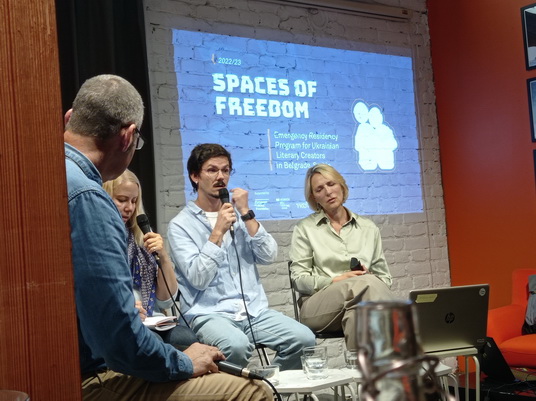
Since the attack was expected in his environment, they wanted to share that information with others, but when they posted on Instagram on February 23 that people should prepare for a conflict, they received "a lot of criticism for spreading panic."
"We knew it would start, but no one believed it would be so cruel," added Livin.
Unlike him, Elina Slobodianiuk stated that she belongs to people who did not believe that such a thing would happen.
"I am a historian, and given my knowledge, I thought that (President of Russia Vladimir) Putin comprehends and understands that an attack and conflict of this scale would certainly end in defeat and the fall of the Russian empire that he is building" said Slobodianiuk, whose house was demolished. While she was still able to work and had access to social networks, she wrote that Ukraine would win. "It was not my personal optimism, but the logic of historians", she stated, still firmly convinced that Putin "will drown with Ukraine".
According to Crocodile’s guests, writers also contribute to this through social engagement.
"Today I bought thermal clothes that could help, because now, according to official data, 30% of the energy system is disabled. There is no electricity... We are a big nation, there are more than 45 million of us, and there are a lot of writers, and every writer has some social capital that he/she can use to help his/her compatriots," said Livin.
Although books on the subject of war are already appearing, Livin believes that it is still difficult to understand what is happening to everyone, it still takes time to experience and think about it.
"Every writer now, of course, tries to help on a social level - he helps his people, helps Ukrainian soldiers, organizes various humanitarian actions... For example, (writer and translator) Andriy Lyubka is engaged in volunteering, and our editor-in-chief, for example, now is at the head of a company near Donetsk. He is now at the location where there are combat operations, and he is a man of incredible intellect, knows foreign languages, versatile... Nevertheless, as an intellectual, he is on the front line and fights with soldiers. The best people are now fighting for Ukraine," said Livin.
"It's now a social standard - writers help the people", added Slobodianiuk, who also thinks that "it's still too early to write a very prominent work about the war", but she also believes that writers should use their potential and write.
"One guy who has a talent for literature told me: 'You know, when we come back after the battle we can't even move.' I tell him: 'Take the phone and record a voice message. What you feel now is precious, priceless", she added.
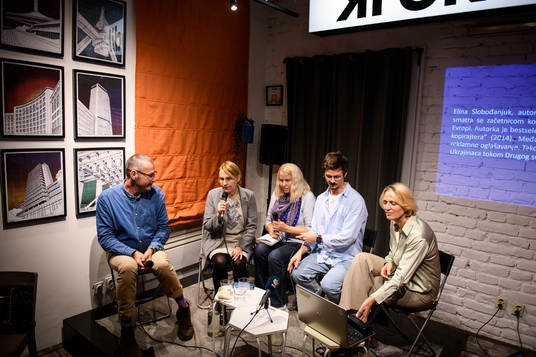
According to Livin, the war led to the creation of a kind of "abyss" between civilians and soldiers, which was one of the motives for his podcast.
"After the war, millions of people who participated in the fight will return and they will be crippled in some sense. They will have visible and invisible wounds. In order to somehow strengthen that connection with the soldiers, we have volunteer psychotherapists on the front line who consciously gave up their lives and jobs in a more peaceful part of Ukraine in order to work, report, and talk with these very people... We understand that these people who return have post-traumatic syndrome because that connection with close people disappears. And that's why right from the start we want to convey how they feel and to help preserve that connection - to create empathy", said Livin.
One of the ways to help the army is through volunteer funds, which collect the necessary funds. Two charities compete with each other - the "Come Back Alive" Fund and the "World of Literature" Fund. "In just one evening, 300 million hryvnias can be collected from donations, which is approximately 10 million dollars.... And of course, all that money is intended for buying satellites, weapons, for the purposes of our defense," Livin added.
Vladimir Arsenijević also referred to this social cohesion, stating that he felt it strongly on the way to Kharkiv, in contrast to the atmosphere that prevailed in this area in the 90s.
"We survived here in the 90s that multi-stage war during which our country Yugoslavia was disintegrating... I wouldn't make a comparison with Ukraine, but one thing that seemed very intense to me, especially during our trip to Kharkiv, and which made me aware of toxicity of our Yugoslav wars in relation to the Russian aggression against Ukraine, is a very intense and, in my opinion, actually optimistic in the long run social cohesion that has been created in Ukraine. We were actually able to live here through that fratricidal war, thanks to the fact that our environments were hopelessly ethnically mixed, and largely remained so - it often happened that your first neighbor was also your worst enemy and potentially your murderer, and in Ukraine, evil comes from outside and this has created a higher level of understanding among the citizens. That was something that was very moving to me. Another thing is the love Ukraine has received from practically the whole world, which is truly impressive. No one on planet Earth can pretend Ukraine doesn't exist anymore. It has become a huge fact in the eyes of the citizens of the entire planet. Only a few societies - countries reacted differently. One of them, unfortunately, is Serbian society," said Arsenijević.
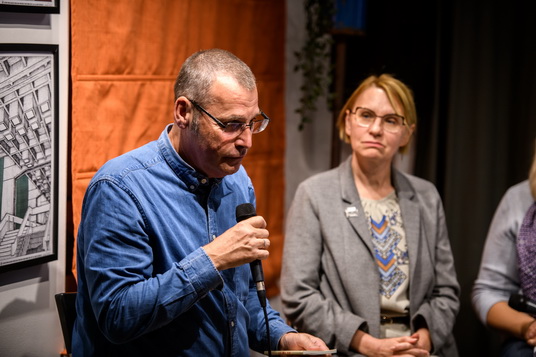
Professor Ljudmila Popović, who has lived in Serbia since 1988, believes that the unity of Ukrainian society in the current war situation is a natural reaction of a community that is defending itself.
Referring to an American study on the post-traumatic syndrome of Vietnam War returnees, many of whom suffered from schizophrenia, she said that it was concluded that - in a situation where you say one thing and mean another in order to do the third - there is a state of schizophrenia. This happened to the soldiers in Vietnam because they were told to go and fight for their country, and they were the aggressors. They were telling them that their mission was to provide freedom, but they were the killers.
"There is no such problem in Ukraine. The society is unique because everyone understands that they are on their own land and they are defending their own, there is no false narrative to make them think. Simply, it happens impulsively and, I would say, even on a reflex level", added Ljudmila Popović, who graduated from the Group for the Serbo-Croatian language with other Slavic languages of the Faculty of Philology of the Kyiv State University "Taras Shevchenko", and from the Faculty of Philology in Belgrade took master's degree and doctorate. She is also active as a mentor, translator of literary and professional texts, editor, organizer of scientific and cultural work, editor...
"This is about the survival of a nation, about the survival of its culture. If there is no victory, there will be no more of that nation. That's why that war is righteous in the eyes of every Ukrainian", emphasized Ljudmila Popović.
Regarding the reaction in Serbia to what is happening in Ukraine, i.e. the lack of empathy - as described by Arsenijević, Ljudmila Popović said that she perceives the people of Serbia as her own and tries to understand them, because "this is the only way to forgive".
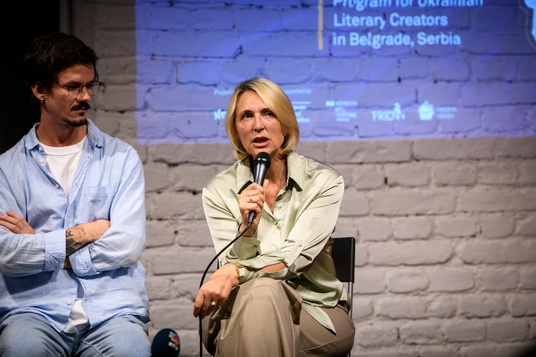
She also recalled the NATO bombing in 1999, especially the beginning. Her brother from Ukraine woke her up on the phone and warned her that the attacks would begin.
"And that first day, as the whole of Ukraine was with us, it was so moving. Everyone called me - friends, colleagues, asking if I was okay... If you remember, that first day wasn't so terrible. We walked around Kalemegdan with family and a little son, but they were terrified. I remember that Ukrainian writers then created an almanac in support of the Serbs, they felt injustice and took the side of those who were unjustly punished due to the leadership's mistake, and after all, most people did not even support Slobodan Milošević. That's why it hurt me that, when this started in Ukraine, the reaction was not like that. There were, of course, those who approached privately and asked - my God, how is your family, are they okay, and then I explained that mine are from western Ukraine, where there is no war, but let's say on that first day - my friend was supposed to bury her father, and when I was woken up and when I found out that there was a war, and I was woken up by my Russian friend, who is a Ukrainian citizen, who is in Belgrade. She woke me up with tears and literally shouted into the phone: 'The war has started!' Then I first thought of my friend who has to bury her father. How will she do that? And that really happened - after she talked to me, when she was fighting her way through, when they were looking for a priest, when the priest couldn't get through the traffic jams on the streets, so they found a priest in the cemetery...", said Ljudmila Popović, who is also one of the signatories of the public protest letter regarding the beginning of the war in Ukraine, published in "Danas".
"It was signed by the leading Slavists of Serbia, there were also professors of Russian language and literature, there were professors of Serbian language and literature... Why do the Slavists insist so much on this? As I mentioned, there were also professors of Russian language and literature, who equally love Russian culture and the Russian people, but at that moment they felt that they had to side with those who were unjustly attacked", said Ljudmila Popović, who presented in detail the analysis of the discourse of newspaper news on the Internet in connection with the "revolution of dignity" on the Maidan in 2014. Referring specifically to readers' comments, she stated that at first they were positive and supported the protest participants, but soon they began to change as the way of reporting also changed, and that narrative has remained until today - a sign of equality is placed between Fascism and European Ukraine, the protesters were portrayed as thugs. Therefore, calls for the arrest of "pro-European extremists" are not surprising".
"Now we see the lies that are being spread non-stop to the public. Among other things, according to the last population census from 2001, 15% of Russians live in Ukraine. When they declared their mother tongue, almost 70% of the respondents answered that it was Ukrainian, and about 30% said that their mother tongue was Russian. This is about the fact that Russians are in the majority in Ukraine. The same lies are constantly repeated, and it is known that a lie that has been repeated many times becomes something like the truth," said Ljudmila Popović.
The question is how this entire situation affects the Ukrainian and Ruthenian minorities in Serbia.
About 5,000 Ukrainians and about 15,000 Ruthenians live in Serbia, many of whom consider themselves ethnic Ukrainians, reminded Prof. Popović, conveying that a compatriot told her at the market that she was afraid to say that she was Ukrainian.
Mark Livin himself said that he thought about presenting himself as someone from Denmark during his three-month stay in Serbia. "No one knows what the Danish language sounds like," he said jokingly, adding that his stay in Belgrade is actually pleasant and that everything he has seen so far reminds him of Kyiv.
Elina Slobodianiuk said that she was trying to "dive into the Belgrade atmosphere as much as possible": "I listen all the time and I think it is a myth that the Serbian and Russian languages are so close because actually Serbian and Ukrainian culture have a lot in common. I think that - when you talk to people, that story will make them change their minds, change their view of these events, because the human-human relationship is always stronger than the human-television relationship", added Elina Slobodianiuk.
*Photo: Alex Dmitrović
(SEEcult.org)
*Funded by the Stabilisation Fund for Culture and Education 2022 of the German Federal Foreign Office and the Goethe Institut


